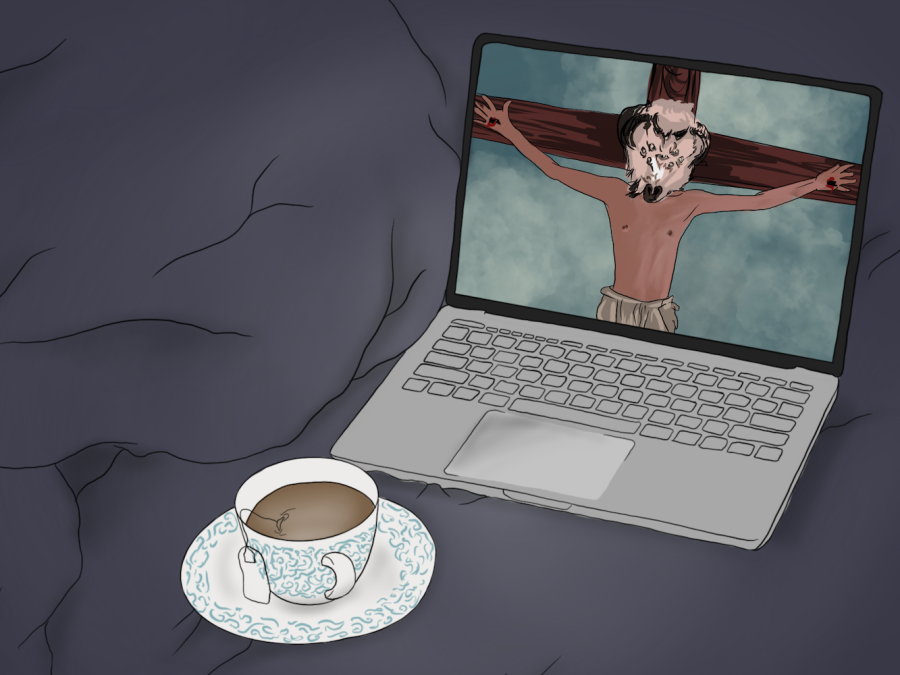Off the Radar: Magic mushrooms, monkeys and melodrama in ‘Altered States’
Off the Radar is a weekly column surveying overlooked films available to students for free via NYU’s streaming partnerships. “Altered States” is currently available to stream on Swank.
(Illustration by Aaliya Luthra)
April 21, 2023
In 1980, the enfant terrible of British cinema Ken Russell decided to venture out to the United States and adapt Paddy Chayefsky’s novel “Altered States.” The book follows a Harvard University researcher and his quest to uncover the origins of consciousness by macro-dosing magic mushrooms in a sensory deprivation tank. In typical Russell fashion, the film strays from Chayefsky’s realist writing in favor of melodrama fueled by surreal imagery and deliberately manic performances. Although Chayefsky disowned the film, it remains one of Russell’s triumphs: an odd blend of religious allegories, psychedelic imagery and ruminations on love. As academic studies on psychedelics come into focus once again after being generally dismissed since the ‘60s, “Altered States,” despite being wildly unrealistic, represents a fun peek into previous imaginings of the scientific potential believed to be held in psychedelic drugs.
In “Altered States,” William Hurt makes his big-screen debut as Professor Eddie Jessup, a “whiz kid,” but a “hoot” according to his colleagues. Toward the beginning of the film he’s studying schizophrenia and the soothing effects psychedelics might have on those experiencing the mental illness. Along the way, however, he gets sidetracked by a series of scientific studies with vague objectives that revolve around research about tripped-out individuals hallucinating in sensory deprivation tanks. He believes these studies might hold the answer to the origin of human consciousness, enabling direct access to the vestigial brain cells of proto-humans locked away in the deepest recesses of the mind.
The wacky backdrop gives way to a variety of playful visuals achieved through ingenious in-camera effects. Just minutes into “Altered States” there’s a dreamy montage of Jessup, with a multi-eyed goat head, being crucified. It’s the sort of effusive creativity Russell has become synonymous with, and which has sadly been lost from studio films since. Though such artistic experimentation may be deemed excessive by today’s standards, Russell justifies it, matching his magisterial visual style with notched-up performances. In doing so, he delivers a perverse over-drama that makes the film not only an intellectually rich text but a visceral experience as well.
Balancing out the bizarre sequences of mind-expanding hallucinations is a sweet story about love. Around the time Jessup begins diving into his research on psychedelics, he meets Emily (Blair Brown), an anthropologist researching non-verbal communication among primates. They become obsessed with one another and quickly get married, only to divorce soon after. It is revealed the latter was Eddie’s idea, as he fears his all-consuming research will mentally break him, physically transform him — into some sort of monkey, no less — and make it impossible for him to play the role of a dutiful husband; perhaps, these are all symptoms of the white male urge to self-combust linked to mid-life crises. Yet, throughout the film, the only thing that seems to keep Jessup from completely falling apart as his experiments get more suspect is thinking about his beloved Emily. Although the mysteries behind the origins of consciousness are intriguing, Russell and Chayefsky’s decision to foreground romance in a film involving high-and-mighty scientific pursuits seems to posit the all-consuming effects of love contain their own powerful secrets.
For all its artistic flair and now-respected genius, “Altered States” sadly represents a downturn in Russell’s career. The film was a financial flop, another strike in a string of kooky studio films for Russell whose previous Warner Bros. effort about a group of nuns possessed by the Devil, aptly titled “The Devils,” was virtually banned around the globe, and critics condemned his biopic about silent screen star Rudolph Valentino for United Artists. Russell became a studio pariah, returning to the United Kingdom to work with smaller budgets, though never losing his edge. “Lair of the White Worm” (1988) and “Il Mefistofele” (1989) both represent his incredible ability to squeeze his budgets in service of outré art late into his filmmaking career. As “Altered States” might be considered a film at the precipice of a career downfall, it may also be deemed an apotheosis for the always weird, daring director.
Contact Nicolas Pedrero-Setzer at [email protected].




























































































































































